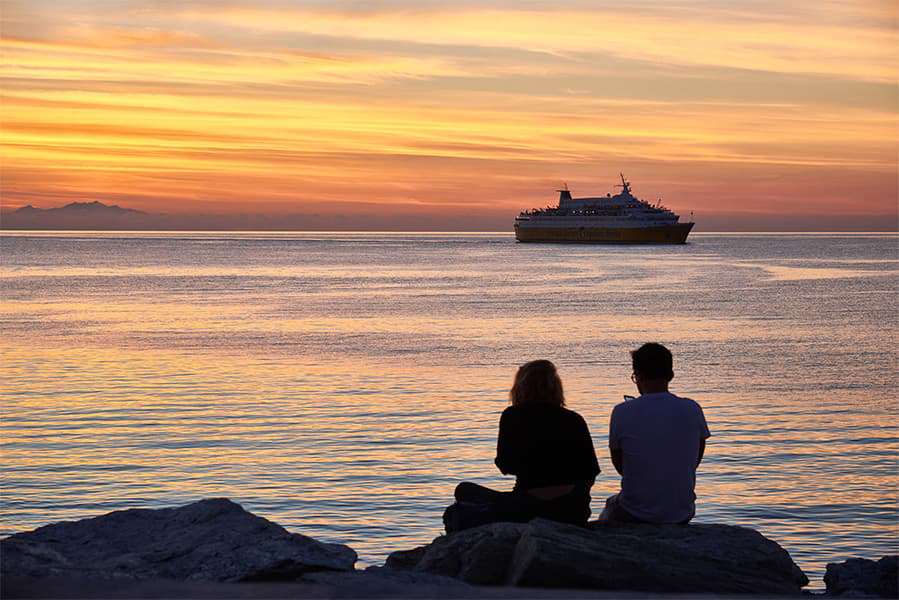Olbia – Piombino
Ferry to Italy
Olbia – Piombino
Ferry to Italy

Depending on the season their are about 4 weekly sailings between Olbia and Piombino.Moby Lines provides the ferry from Olbia to Piombino. Olbia Piombino ferries take around 5 hours 30 minutes. The ferry costs between $239.36 and $1,131.20, depending on ticket details. Prices exclude any service fees. Ferry timetables change seasonally, use our Deal Finder to get live pricing and availability for ferries from Olbia to Piombino.
Olbia Piombino ferries depart at around 08:15.
Ferries from Olbia to Piombino sail in around 5 hours 30 minutes. Ferry duration can vary by ferry provider and can be impacted by weather conditions.
There is 4 weekly sailings from Olbia to Piombino provided by Moby Lines. Timetables can change from season to season.
The price of a ferry from Olbia to Piombino typically range between $239.36* and $1,131.20*. On average the Olbia Piombino ferry is $525.51*. The cheapest Olbia Piombino ferry prices start from $239.36*. The average price for a foot passenger is $198.21*. The average price for a car is $514.81*.
Pricing will vary depending on number of passengers, vehicle type, route and sailing times. Pricing is taken from searches over last 30 days and exclusive of service fees, last updated 1 April 2025.
The distance between Olbia to Piombino is approximately 154 miles (247km) or 134 nautical miles.
Yes, Olbia Piombino ferries allow cars onboard with Moby Lines between Olbia and Piombino. To view car ferry tickets and prices between Olbia and Piombino use our Deal Finder.
Moby Lines allow foot passengers on Olbia Piombino ferries.
Currently, are not permitted to board ferries from Olbia to Piombino.
More routes than anyone else.

Compare fares, times & routes in one place.
Change plans easily with flexi tickets.

Book e-tickets & manage trips in-app.
Live ship tracking & real-time updates.

Top-rated customer support when you need it.
The Italian city of Olbia is located in the Gallura sub region of north east of Sardinia. The town is now known as a stop on the journey to and from Sardinia, however it has a long history and retains enough of its own charm to justify it as a destination in itself. The historic town centre is a lovely place to take a stroll or to sit in a bar or restaurant and watch the world go by. Popular visitor attractions in the town include the medieval Pisan-Romanesque church which is built out of Galluran granite. Two 13th century frescos can be found in the church. One depicts San Simplicio, the patrol saint of Olbia. Another popular attraction in the town is the Festa di San Simplicio which is Olbia's largest festival and is celebrated for three days every May.
The town isn't very expensive and is definitely a great place to spend a day or two. Aside from attractions in the town itself, there are some lovely beaches nearby or alternatively Olbia is a great place from which to take boat trips.
Olbia's port is on an island linked to the town by a long causeway. Car ferries connect Olbia with mainland Italian destinations including Genoa and Civitavecchia, near Rome. ASPO bus number 9 connects the port with the town. Additional destinations are available from Golfo Aranci, a port to the north of Olbia.
The Italian town of Piombino was once the ancient port of Felesia and today provides its many visitors with two splendid viewpoints that enable visitors to fully appreciate the town's amazing coastline. Providing stunning views over the sea is the natural terrace of Piazza Bovio and at the old port visitors will find the perfect location to sit and watch the hive of activity in the fishing port, along with its daily auction. The town is characterised by its paved streets that are lined with restaurants and wine bars and where delicious local food and wine can be sampled. In fact, the region has a strong links with gastronomy which includes the local growing of Baccala and potatoes and its local fish stew which contains Caciucco, Cuttlefish and stewed or stuffed Mussels. Piombino's 'Little Paris' district, named in reference to the rule of Elisa Bonaparte, contains a number of historic buildings that serve to remind visitors of the city's importance during the Middle Ages and the Renaissance. These include the Rivellino, the Palazzo Nuovo, and the 16th century castle built by Cesare Borgia to defend the city.
From the port of Piombino ferries depart direct to the islands of the Tuscan Archipelago (Elba Island is just 10km from the coast), as well as to Sardinia and Corsica.